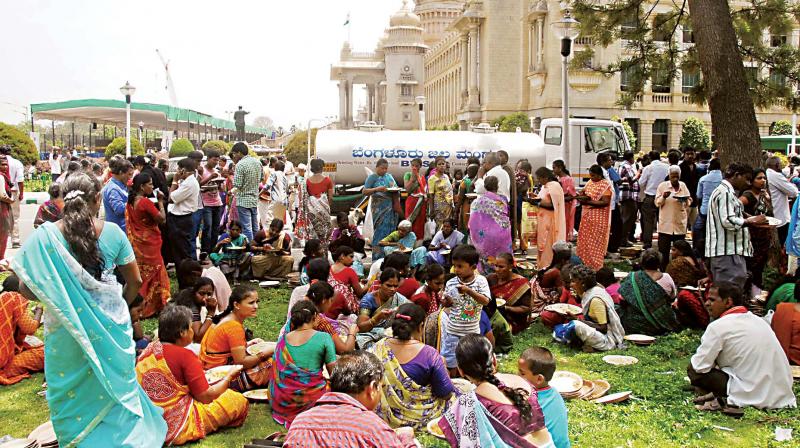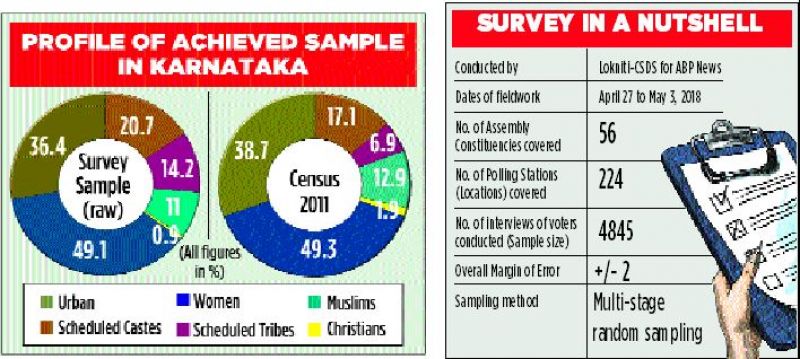Bhagyas to keep Karnataka CM's future bright!
Govt looks weak in creating job opportunities. Anti-incumbency votes divided between BJP, JD(S)

The Lokniti-CSDS-ABP News Poll gives enough indication as to why the Congress appears to have surged ahead of its rivals, the BJP and the JD(S). Clearly, the report card of the government has many positives. The government is favourably considered for improving the condition of roads, providing more regular power supply and drinking water.
Six of every 10 respondents spoke of an improvement in these key areas. However, the voter is a little concerned about the state of religious harmony and the condition of the government hospitals.
When asked to compare and contrast the three major political parties in Karnataka on key variables, most of the respondents seemed to prefer the Congress for providing solutions to Karnataka’s problems. They preferred the Congress over BJP and JD(S) as the best party for the state’s overall development, for solving the border dispute with Maharashtra, for youth, for curbing corruption, and for the respondents’ community.
The BJP was favoured the most to resolve the Mahadayi issue and to resolve problems of towns and cities. Interestingly, the JD was the most favoured to resolve the Cauvery issue. The BJP was seen as the most corrupt and faction- ridden, and the Congress as more nepotistic. The JD(S) was a close third when it came to all the above mentioned state related issues, but a distant third on being corrupt, faction-ridden or nepotistic. Nearly eight out of every 10 voters said they were unhappy with the rising prices of essential commodities and six out of 10 with rising corruption.
Dissatisfaction with availability of jobs was also evident as only one- sixth of the respondents felt that employment opportunities had increased. When asked if they or any member of their families had benefitted from any of Siddaramaiah government’s welfare schemes, around six out of every 10 respondents said they had , with four in five having benefited from Anna Bhagya, and over half from Ksheera Bhagya.
While the respondents had heard and benefited from the Anna Bhagya, Ksheera Bhagya, Akshara Dasoha schemes, they had heard of but not benefited from the Indira Canteen, the cycle and Krishna Bhagya schemes (only two out of 10 said they had benefited from the latter).
In responding to questions on who should be given credit for the welfare schemes, the Union government, the state government, the local politician or government official, two out of every five respondents said they would credit the state government and only one out of 10 said the Union government.
When asked if they had heard of the Pradhan Mantri AwasYojana, three out of every five said they had heard of its, but less than one- fourth said they had actually benefited from it. Similarly while seven out of every 10 had heard of the Rozgar Guarantee Yojana (MNREGA), close to three out of every 10 said that they had actually benefited from it.
Again, while seven out of every 10 had heard of the free medical facilities provided by the National Rural Health Mission, only one third said their family members had actually benefited from it. When it came to the Prime Minister Suraksha Bima Yojana six out of 10 said they had not heard of it and only 10 per cent said that they had actually benefited from it. Similarly, while a little over half the respondents had heard of the Jan DhanYojana, only one fourth had benefited from it.
On the much-publicised Swachch Bharat programme – while seven out of every 10 said they had heard of it only one -third said they had benefited from it. Less than half the respondents had heard of Digital India, Prime Minister’s Skill India, Make in India or Ujjwal Yojana programmes and a very small percentage claimed to have benefited from them.
The most important issue for Karnataka voters seems to be development (vikasa), with three out of 10 respondents prioritizing it over everything else. This was followed by the MLA’s performance and his/ her personality.
This clearly shows that the Karnataka’s voters do not seem to be swayed by party preferences alone, but prioritise development and the work carried out on the ground by the legislator over a particular party. These issues were followed by leadership, concerns over poverty and farmer and agriculture related issues etc.
Most voters are satisfied with the Siddaramaiah government as more than seven out of every 10 voters were either satisfied or very satisfied with it. This satisfaction translates into a vote for it with four out of every 10 voters saying the Congress government should get another chance. This opinion has remained the same from the pre-poll survey conducted two weeks ago.
However there is a four percentage point dip since two weeks ago in the overall perception about not giving it another chance. But despite the dip it is still quite high at 47 percent. Among those who do not want to give the Congress another chance, 53 per cent (same as two weeks ago) are leaning towards the BJP and 34 per cent (two percentage point increase since last poll) towards the JDS. Clearly the split in the anti-Congress vote is benefitting the ruling party.
Dr Reetika Syal is the Lokniti Coordinator for Karnataka and Dr Priyanca Mathur Velath is an Associate Professor at JAIN- A Deemed to be University.
Lokniti-CSDS-ABP News Poll: how it is done
A Pre-Poll Survey was conducted in Karnataka by Lokniti, Centre for the Study of Developing Societies (CSDS) for ABP News. The survey was conducted from April 27 through May 3, 2018 among 4929 voters in 224 locations (polling stations) spread across 56 assembly constituencies (the State has a total of 224 assembly constituencies). The sampling design adopted was multi-stage random sampling.

The assembly constituencies where the survey was conducted were randomly selected using the probability proportional to size method. Thereafter, four polling stations within each of the sampled constituencies were selected using the systematic random sampling method. Finally, the respondents were randomly selected from the electoral rolls of the sampled polling stations.
The fieldwork of the survey was coordinated by Dr. Reetika Syal of JAIN (Bengaluru) and Dr. Veena Devi of Bangalore University. The survey was designed and analyzed by Prof. Sandeep Shastri, Prof. Sanjay Kumar, Prof. Suhas Palshikar, Dr. Reetika Syal, Dr.Veena Devi, Mr. Himanshu Bhattacharya and Mr. Shreyas Sardesai.

